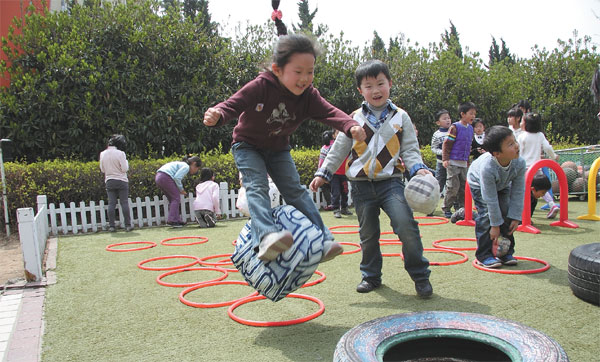Further improvements planned for the future
Qingdao, a coastal city in Shandong province, has mapped out a long-term plan to boost the development of its education system, said a senior education official in the city.
Since the city launched its mid- and long-term education reform and development program in 2011, it has made progress in expanding local education sources, promoting teaching experience exchanges and building a modern education system, said Deng Yunfeng, director of Qingdao Education Bureau.
Qingdao made headlines in 2014 because it was the first city in the country to launch a new three-year preschool education program that aims to address the shortage of kindergarten places available to children.
|
Qingdao has invested heavily in preschool education in recent years to meet residents' increasing demand. |
"We proposed that by the end of 2016, Qingdao would establish a comparatively advanced public service system for preschool education with sufficient resources and benefit more people," Deng said.
"We hope that by then, Qingdao's preschool education level in many aspects, including financial input and education quality, can reach China's advanced level of similar cities," he said.
In 2014, Qingdao carried out reforms in many areas of the nine-year compulsory education, high school education, vocational education, special education and private education.
Deng said Qingdao uses a rotation system, where principals and teachers move schools to boost equality in teaching expertise across schools in the city.
"To balance teaching quality and to let more students have the chance to receive better education, the rotation has been enforced between schools in urban and rural areas, between well-known schools and schools with comparative weakness es in teaching skills," he said.
To make full use of the city's education resources and experience, the Qingdao Education Bureau also encourages well-known schools to establish branches to explore new approaches to balance compulsory education level teaching in rural and urban areas.
For private education development, Deng said 18 measures were launched to promote the sector in 2014.
"We hope to extensively attract social forces and private capital through individual proprietorship, joint ventures and cooperation, to participate in private education and provide more choices for our residents," Deng said.
In a 2014 survey on education development in 15 cities, Qingdao's education fairness index ranking increased from 10th in 2013 to fourth last year.
"We are also glad to learn that more of the residents that participated in the survey were satisfied with our work," Deng said.
Although the city has made great progress, it still faces many difficulties before it is fully reformed, according to Deng.
"Taking the principal and teacher rotation system for instance, because of the differences in school locations and working environment and facilities, some principals and teachers find it hard to accommodate themselves to the new working conditions," he said.
"To solve these problems, we are working out how to practice the rotating system within the districts to reduce the inconvenience," Deng added.
More than 2,700 teachers and 200 principals participated in the rotation scheme in 2014.
"We want to tell our residents that good schools and teachers are in front of your doors. The rotation system greatly lessens the difficulty in choosing a school," Deng added.
huqing@chinadaily.com.cn
(China Daily 05/23/2015 page6)















